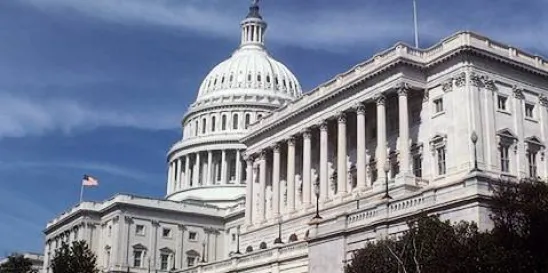THIS WEEK’S DOSE
- House Speaker Vote: The House remained stalled after Rep. Jim Jordan (R-OH) failed three times to reach the 217 Republican votes necessary to become speaker of the House.
- House Hearings: House committees held hearings on safeguarding Americans’ data and investigating pandemic fraud as well as a legislative hearing on patient access and provider payments in Medicare.
- Senate Hearings: Senate committees held hearings on Medicare Advantage (MA) marketing practices, methods to lower healthcare costs and the nomination of a new National Institutes of Health (NIH) director.
CONGRESS
House Republicans Still Unable to Elect New Speaker. As of publication of this newsletter, the House has held three roll call votes this week to elect a new speaker, with Rep. Jordan (R-OH) failing all three times to secure the 217 Republican votes necessary to win in the face of uniform opposition from House Democrats. With Republicans still unable to coalesce around a candidate who can achieve 217 votes, next steps on the speaker election remain unclear.
There has been talk around a possible strategy of empowering the Speaker Pro Tempore role as an interim step to permit the House to conduct business; however, it became clear this week that the Republican Conference is deeply divided on that approach. For that to become an option, it would likely require a small group of Republican members to conduct outreach to Democrats and get broad support from Democratic members to move it forward. Those Republican members would also need to be able to withstand strong and broad opposition from their Republican colleagues and from Republicans outside of Congress.
Regular business on the House floor remains stalled at a time with pressing legislative needs, including work on FY 2024 appropriations bills before the fast-approaching November 17, 2023 expiration of the continuing resolution keeping the government open and consideration of the President’s new request that was sent to Congress on October 20 to provide emergency aid for Israel, Ukraine and more.
House Energy & Commerce Committee Holds Hearings on Data, Patient Access in Medicare. The Innovation, Data and Commerce Subcommittee met to discuss safeguarding Americans’ data and announced the hearing as the first in a series that will explore the role of artificial intelligence across every sector of the economy, including healthcare, telecommunications, emerging technologies and energy. Multiple members and witnesses pushed for data minimization standards to ensure collection of no more data than necessary. Members and witnesses highlighted the use of impact assessments, a tool to assess how data collection use and storage is affecting consumers. Multiple members and witnesses expressed concern and frustration with companies collecting data on children and exploiting it harmfully. Members were encouraged to enact legislation that builds on the foundation of the American Data Privacy and Protection Act passed last year, and witnesses encouraged Congress to enact more privacy protections.
The Health Subcommittee held a legislative hearing to examine physician payment policies, including legislative policies aimed at furthering the objectives of the Medicare Access and CHIP Reauthorization Act of 2015. During the hearing, Democrats noted concern over the fact that over half the bills included in the hearing were either in discussion draft form or introduced only a week ago, with little time for review. Democrats and Republicans shared different views on reimbursement cuts and their impact on healthcare. Democrats expressed concerns about the effects of such cuts on physician practices and access to care. Some Republicans raised doubts about data accuracy and the potential for cost-saving measures. Representatives discussed several bills and legislative proposals, including clinical laboratory reimbursement cuts and support for specialty office-based providers, as part of ongoing efforts to tackle Medicare providers’ challenges. Representatives emphasized the importance of collaboration across party lines for finding viable solutions to these complex issues.
Senate Finance Committee Examines MA. The committee held a hearing to examine MA practices and how they impact seniors’ access to care. The hearing identified and addressed concerns related to misleading or aggressive marketing practices and the influence of brokers and other third-party entities that can lead Medicare beneficiaries—often those who are most vulnerable—to sign up for health plans that don’t meet their particular health needs. It also included a discussion on potential reforms and solutions to enhance consumer protection, ensure fair competition, and improve transparency in marketing and compensation practices. Many senators underscored the growing importance of the MA program, highlighting the significant and increasing number of seniors choosing MA, and noting that the program plays a vital role in providing healthcare coverage to about 50% of Medicare beneficiaries. Some witnesses and senators voiced concerns about the concentration of MA enrollment in a few national companies, potentially limiting competition and plan choices for beneficiaries.
Senate HELP Committee Holds Nomination Hearing for New NIH Director. The hearing included discussions relevant to cancer research, drug development, clinical trials and artificial intelligence. During the hearing, Dr. Monica Bertagnolli declined to answer Chairman Sanders (I-VT) when he asked if she would reinstate and expand the reasonable pricing clause in NIH contracts. She also declined to answer Ranking Member Cassidy (R-LA) when he asked if she would refrain from using the reasonable pricing clause in NIH contracts. The committee plans to vote on Bertagnolli’s nomination on October 25, 2023. Chairman Sanders has not said whether he will support her nomination.
Senate Budget Committee Holds Hearing on Healthcare Costs. The committee discussed solutions to lower costs and increase healthcare efficiency. Ideas to reduce spending focused on value-based care, accountable care organizations and the role of primary care. The high rate of US healthcare spending was discussed, along with lower-than-expected Medicare expenditure projections and potential explanations. There was bipartisan agreement on the need to reform the prior authorization process in light of the shift toward value-based care.
ADMINISTRATION
CMS Holds National Stakeholder Call. The Centers for Medicare & Medicaid (CMS) quarterly national stakeholder call discussed recent accomplishments and future goals. CMS leadership emphasized the agency’s continuous efforts to hold states accountable for following federal requirements with Medicaid and Children’s Health Insurance Program renewals. CMS also highlighted the Inflation Reduction Act’s role in improving beneficiary access and lowering costs, and noted accomplishments in advancing health equity and reducing health disparities, including a sickle-cell disease action plan. CMS also discussed 2024 Medicare benefits, including financial relief from high drug costs for beneficiaries enrolled in Medicare Part D.
QUICK HITS
- Project NextGen Awards for Vaccine and Therapeutics Development. The US Department of Health and Human Services (HHS), through the Administration for Strategic Preparedness and Response, announced the selection of initial next-generation vaccine candidates and more than $500 million in awards for Project NextGen for clinical trials and technologies that advance innovative next-generation vaccine and therapeutics platforms.
- HHS and Pfizer Reach Agreement to Increase Patient Access to Paxlovid. HHS and Pfizer have reached an agreement that extends patient access to Paxlovid to mitigate the effects of a COVID-19 infection and begins Paxlovid’s transition to the commercial market in November 2023. Key features of the agreement include protecting individuals in public programs, ensuring no HHS-procured product is lost to expiry, creating a stockpile for future emergencies and providing a smooth transition to the commercial market.
NEXT WEEK’S DIAGNOSIS
Healthcare activity is expected at the committee level next week, including a House Energy & Commerce hearing on the long-term care workforce and a controversial Senate HELP Committee field hearing on the hospital staffing crisis. The Senate HELP Committee also is expected to vote on the nomination of Monica Bertagnolli to be director of NIH. Stakeholders are watching for final payment rules that are now at the Office of Management and Budget awaiting clearance.







 />i
/>i

